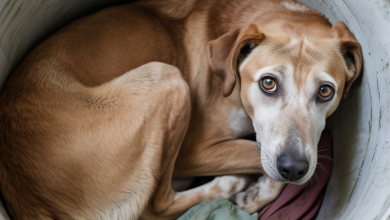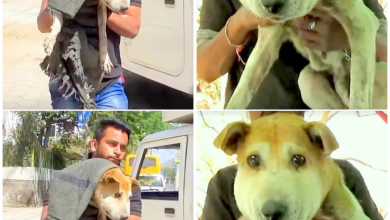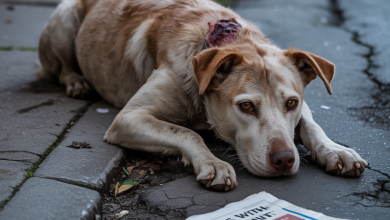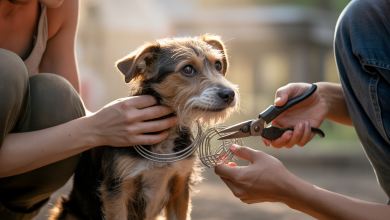The Janitor and the Demigod: How an Everyday Hero and a Dog Named Hercules Fought Their Way Back to Life
The life of a building maintenance worker is a symphony of the mundane. It’s a rhythm of squeaking hinges, dripping faucets, and the low hum of electricity flowing through the veins of a building. It’s a world of routine, of checklists, of solving the small, predictable problems that arise in the ecosystem of a community living under one roof. Frank had been a maintenance man in Clayton, Georgia, for fifteen years.
He thought he had seen it all. He had dealt with burst pipes that flooded hallways, electrical shorts that plunged floors into darkness, and the endless, quirky complaints of residents. His days were governed by a work order clipboard and a hefty ring of keys that could unlock any door. But on one humid August afternoon, one of those keys would unlock a door to a horror so profound it would shatter his routine and redefine his understanding of good and evil.
The work order was simple enough: «Apt 2B - Investigate potential water leak reported by downstairs neighbor.» Frank grabbed his tools, clipped his keys to his belt, and headed up the stairs. He knocked on the door of 2B. There was no answer. He knocked again, louder this time, announcing himself. «Maintenance! Here to check on a water leak.» The silence that answered was heavy, unnerving. This wasn't unusual; tenants were often out. After a few more attempts, he pulled out his master key, as was protocol.

The moment the lock clicked open, the first thing that hit him was the smell. It was a thick, suffocating wave of ammonia and decay, an odor so foul it made his eyes water and the bile rise in his throat. It was the smell of long-term neglect, of life festering in filth. Frank’s instincts, honed by years of entering people's private spaces, screamed that something was terribly wrong. He pushed the door open and stepped inside.
The apartment was dark, the blinds drawn tight against the afternoon sun. The air was stagnant and thick. As his eyes adjusted, he saw the source of the leak—a small puddle forming near the bathroom. But his attention was immediately ripped away from the plumbing issue by something else, something in the far corner of the living room. It was a wire cage. And inside the cage was a shape.
At first, he wasn't sure what he was looking at. It was a heap, a pile of bones draped in dull, patchy fur. But then the shape moved. A head lifted, slowly, painfully, as if the effort was monumental. And two eyes, bleak and hollow, met his. It was a dog. A pit bull, perhaps, though it was hard to tell. He was so emaciated that every bone in his body was starkly visible, a gruesome xylophone of a ribcage, a skull-like head with sunken eyes. He was lying in his own waste, the cage too small for him to even stand or turn around properly. He was a living skeleton, a prisoner in a torture chamber masquerading as an apartment.
Frank stood frozen in the doorway, his toolbox slipping from his suddenly nerveless fingers and clattering to the floor. The dog flinched at the sound but made no noise. He simply stared, his gaze a bottomless well of despair. It was not a look of aggression or fear, but something far worse: a look of complete and utter surrender. It was the look of a creature who had given up on life, who was simply waiting for death to finally release him from his suffering. Frank had seen sad things in his life, but he had never seen anything that radiated such profound, silent agony. This was not neglect; this was a slow, deliberate execution.
A cold, hard rage, unlike anything he had ever felt, seized Frank. He wanted to find the person who had done this, the monster who could leave a living being to rot in a cage. But that anger was immediately followed by a wave of desperate urgency. This dog did not have weeks or even days. He had hours, maybe.
Frank’s training, the rulebook that had governed his entire career, was clear. He was to back out, lock the door, and call the authorities. He should notify building management and they would call Animal Control. It was the logical, procedural thing to do. He even reached for his phone, his thumb hovering over the numbers. But then he hesitated. He thought about how the system worked. Animal Control was overworked and understaffed. They might not be able to send an officer right away. And when they did, what if the owner was home? Or what if they weren’t? They would likely just tape a notice to the door, a formal warning, leaving the dog to continue suffering inside. The process could take days, a bureaucratic dance of notices and warrants. This dog didn't have days. The rules were not designed for a situation this dire.
Frank looked back at the dog, at the skeletal frame and the hopeless eyes. He was presented with a choice, a clear and stark crossroads between following the rules and doing what was right. In that moment, Frank ceased to be just a maintenance man. He became a human being with a moral imperative. To hell with the rules. He was getting that dog out of there. Now.
He walked over to the cage, his heart pounding. «It's okay, boy,» he whispered, his voice thick with emotion. «I'm here. I'm getting you out.»
As he fumbled with the rusty latch on the cage, a sound finally escaped the dog. It was a low, mournful cry, a sound of such pure misery it felt like a physical blow. When the cage door swung open, the dog didn't move. He just lay there, trembling, perhaps believing this was just another part of the nightmare. Frank reached in slowly, his hands gentle. The dog flinched but didn't snap.
«Come on, buddy. Let's go,» Frank urged softly.
The dog tried to move, to stand, but his atrophied muscles couldn't support even his meager weight. He collapsed back onto the filthy floor of the cage with a pained whimper. Frank’s heart shattered. Without another thought, he carefully, gently, scooped the dog’s skeletal frame into his arms. The dog felt like nothing, a fragile collection of bones wrapped in skin. He was so light. As Frank lifted him, the dog began to cry in earnest, a high-pitched, screaming sound of terror and pain, the first real noise he had made.
Frank grabbed a semi-clean towel from the bathroom, wrapped the trembling, crying animal in it, and walked out of that apartment without a backward glance. He didn't lock the door. He didn't care about the water leak. All that mattered was the fragile, suffering life he now held in his arms. As he carried him to his truck, the dog, despite his terror, pressed his head weakly against Frank's chest. Frank looked down at the pathetic, beautiful creature and gave him a name. «It's alright, Mikey,» he said, the name simple and gentle, a stark contrast to the horror they were leaving behind. «It's going to be alright.»
The drive to the Grayson Animal Hospital felt like the longest of Frank’s life. Mikey’s screaming cries eventually subsided into quiet, shuddering whimpers. Frank drove with one hand on the wheel, the other resting on the dog’s bony back, speaking to him the whole way. When he burst through the hospital doors, the receptionist’s eyes went wide with shock. A vet tech rushed out, and the scene quickly turned into one of organized, urgent compassion.
They laid Mikey on an examination table, and the full extent of his condition became horrifyingly clear. He wasn't just thin; he was a medical specimen of starvation. His paws were covered in painful rashes and sores from lying in his own waste. He weighed in at just under 10 kilograms, or about 22 pounds. For a pit bull of his frame, he should have weighed at least 20 kilograms, more than double his current weight.
Alice Cinnamon Koch, a veteran rescuer affiliated with the hospital, was there that day. When she saw Mikey, she stopped dead, her hand flying to her mouth. «When he arrived here he was crying, screaming, he was incredulous,» she would later recall, her voice shaking with the memory. «This is the worst case I have ever seen.»
The veterinarian, Dr. John Tolliver, was equally horrified but maintained a professional calm. His initial assessment was grim. The dog was in the final stages of starvation, his organs likely beginning to shut down. He was severely dehydrated and anemic. His survival was far from certain.
But then, something incredible happened. In the midst of the poking and prodding, the whirlwind of medical intervention, Mikey did something that stunned them all. As Alice gently stroked his head, trying to soothe him, he mustered every ounce of strength he had, lifted his head, and gave her hand a weak, tentative lick. A moment later, he did it again, trying to kiss her. Dr. Tolliver paused, his stethoscope still on the dog's chest. Here was a creature who had known nothing but pain, cruelty, and imprisonment at the hands of a human, and yet, his first instinct upon receiving a gentle touch was to offer affection in return. His body was broken, but his spirit, his sweet, loving soul, was not.
«My God,» Alice whispered, tears welling in her eyes. «He's so sweet and affectionate. All he wants to do is kiss you.»
It was in that moment that a new name for him was born. One of the young vet techs, watching in awe, said, «To have survived this, to still have a heart that loving… he's got the strength of a Hercules.» The name hung in the air, feeling instantly, profoundly right. Mikey was the name Frank had given him in a moment of pity. But Hercules was the name he would earn, a name that was not just a title, but a prophecy.
Hercules’s road back from the brink was a slow, painstaking process. He couldn't simply be given a large meal; in his state, that could kill him. He was put on a strict, careful re-feeding schedule of small amounts of a special digestive food, administered every few hours. He was hooked up to an IV for fluids and nutrients. His paws were treated and bandaged. For the first few days, he did little more than sleep, his body finally getting the rest it had been denied for so long.
Frank, the man who saved him, visited every single day after his shift. He would sit by Hercules's kennel, speaking to him in a low, steady voice, his presence a constant, reassuring anchor. Hercules came to recognize the sound of Frank's work boots in the hallway and would lift his head in anticipation, his tail giving a weak but hopeful thump-thump-thump against his bedding.
The story of the maintenance man and the dog he saved began to spread. A local news station picked it up, and soon, the tale of Hercules’s horrific abuse and incredible spirit captured the heart of the community. And in that community, four young hearts were particularly touched.
Apbelle, Ari, Addie, and Rylee were four friends, all under the age of ten. They saw Hercules’s story on their parents’ Facebook feeds. They saw the pictures of the skeletal dog, heard the story of his rescue, and were moved to tears by his plight. But they didn't just feel sad. They felt a fierce, childish conviction that they had to do something. They decided to set up a lemonade stand. For a whole weekend, they sold lemonade and cookies in their neighborhood, their hand-painted sign reading, «Lemonade for Hercules!» They pooled that money with their allowance and, a few days later, walked into the Grayson Animal Hospital with their parents, proudly holding a jar filled with crumpled bills and coins. They had raised over a hundred dollars for his care.
They were allowed to meet their hero. Hercules, who was now strong enough to take short, wobbly walks, greeted them with gentle licks and a happily wagging tail. The sight of the brave, healing dog and the four earnest, compassionate little girls was a beautiful, powerful tableau that left not a dry eye among the hospital staff. It was a perfect storm of goodness, a powerful counter-current to the evil that had been done to this one innocent dog.
Weeks turned into months. Hercules continued to heal. His weight crept up, slowly but steadily. The rashes on his paws cleared, replaced by healthy pink skin. A new coat of sleek, brindle fur grew in, covering the bones that had once been so starkly visible. The light in his eyes grew brighter, and the puppy that had been buried alive under layers of pain and starvation began to emerge. He learned to play with toys, pouncing on a squeaky ball with a goofy, joyous abandon. He learned that the sound of a food bowl meant a delicious meal was coming, not a rare, desperate hope. He learned that human hands were for petting and scratching behind the ears, not for causing harm.
Meanwhile, the authorities, alerted by the hospital and Frank, were investigating the former tenant of apartment 2B. But as the legal process ground on, a more important question arose: what would happen to Hercules when he was fully recovered? Adoption applications poured in. But there was only one person the staff at the hospital, and Hercules himself, truly considered family.
Frank had never intended to adopt a dog. His life was simple, his apartment small. But his daily visits to the hospital had become the most important part of his day. He had not just saved a dog; he had forged an unbreakable bond. He was Hercules's person. The decision, when it came down to it, was the easiest one he'd ever made.
The day Frank officially adopted Hercules was a celebration. The four little girls came, bringing a new collar and a bag of toys. The entire hospital staff gathered to say their goodbyes. As Frank signed the final paperwork and clipped the leash onto Hercules’s new collar, the dog looked up at him, his tail wagging furiously. It was a circle completed, a story that had begun in the darkest of places ending in the brightest of lights.
Hercules's story is not just about a dog. It’s about the hero we all have inside of us. It’s about the Frank in the world, the ordinary people who, when faced with an extraordinary moral choice, choose to do the right thing, no matter the personal cost or inconvenience. It’s about the four little girls, who remind us that compassion is an instinct we are born with. And most of all, it's about a dog who was given a name of a demigod and, against all odds, with a heart full of love and a spirit full of fight, managed to live up to it. He was no longer a bag of bones asking for help with a bleak look; he was Hercules, a living, breathing, tail-wagging legend.



